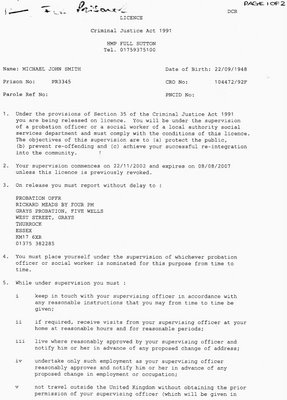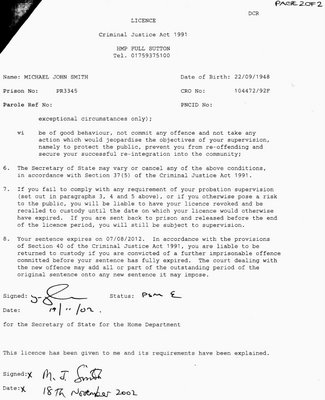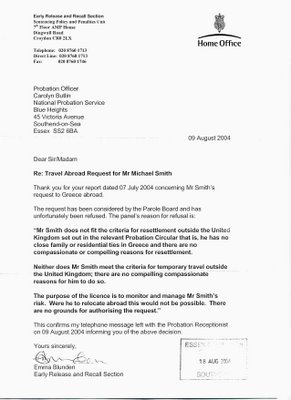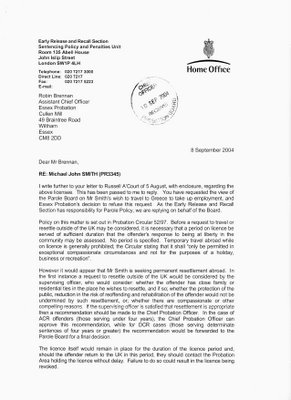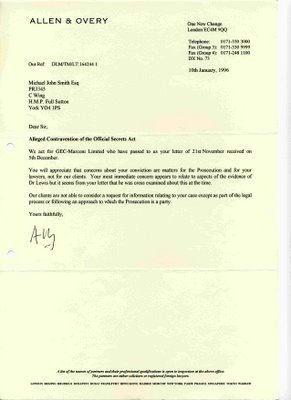From: William E. Colby
Law Offices of Donovan Leisure, Rogovin, Huge & Schiller
1250 Twenty-fourth Street, N.W.
Washington, D.C. 20037-1124
April 29 1993
To: Gary Summers
London
Dear Mr Summers,
I have reviewed the material you sent to me by Fax and I have consulted two friends who are qualified in this field (without identifying you or your client). Perhaps the best way for me to communicate my conclusions would be by following the points in your paragraph 7:
(i) The notes are consistent with tradecraft in the intelligence profession, although I would hardly term them any kind of conclusive “evidence”. As the Crown states (your para. 4), the various practices outlined in the six areas stated have been used is espionage tradecraft, but they are really generic in character and would be and have been used by any persons wishing to maintain a relationship but conceal it from others (embezzlers, adulterers, price fixers, kidnappers and other criminals and conspirators for whatever cause or reason). In other words, intelligence tradecraft is not sui generis, but adopts some of the practices and habits of life generally to carry on its secret relationships.
(ii) From the above, it is apparent that the notes are hardly evidence of KGB tradecraft, since they reflect arrangements which could have been made by any intelligence service, or even for other purposes than intelligence. It is true that the KGB has used such arrangements, but so have others. Such arrangements as setting meeting places, dead drops, etc., in suburban areas so that counter surveillance can be detected, writing quite vague and anodyne notes such as the one included in your Fax. Or arranging for casual signals of the Coke can or the flower pot in the window (or not) variety are quite normal. Of course, your client’s case would be assisted if he could provide some benign explanation of the notes and arrangements.
(iii) The KGB has certainly used the procedures outlined in your para 4, but these have also been used by others.
(iv) One of the basic rules of intelligence tradecraft is not to make a record which can be read by others (e.g. marking a map, keeping telephone numbers or addresses of contacts or of course outlining provisions for emergency contact or re-establishing contact). I also am somewhat surprised at the specific references to times and days of re-contact, as, for instance, in my own work I always arranged that a reference to a specific time or date for a future meeting really referred to a time somewhat ahead and different from the time stated - so that if overheard and an attempt made to intercept, the meeting would have already transpired.
In your para. 6, you repeat several other Crown statements which bear examination:
- As I stated above, such signals are generic, and can hardly be limited to the SVR and KGB. The Crown might argue that in the circumstances of the case (in Britain, for example, that it is unlikely that any other service would be conducting such operations), but since such signals are generic they could be used by any other service active in Britain, e.g. the Iranians or the IRA.
- They could stem from such instruction, but this is hardly evidence that they did.
- This contention depends on what other explanation Smith might have for the notes. They could have reflected an intelligence relationship but they might stem from any other secret relationship.
Returning to your para. 7:
(v) These signs and symbols may have been used by the KGB, but they have no monopoly on the techniques. As said above, they are an adaptation of the processes of normal life to pass secret messages, and are not exclusive to intelligence or the KGB.
(vi) Other intelligence services certainly use comparable tradecraft practices, as I did myself during some of my operational days. One can hardly conduct intelligence operations without them.
(vii) Several publications might help to understand KGB practices:
American:
William Hood: MOLE
Jerrold Schecter: THE SPY WHO SAVED THE WORLD
Ron Kessler: SPY VS. SPY
William Johnson: Stonehill Press Pubs
These may be obtained from The National Intelligence Book Center, Lock Box Mail Unit 18757, Washington DC 20077-6308 (or let me try to find them for you)
Britain:
Andrews & Gordievski: INSTRUCTIONS FROM THE CENTRE;
Hodder & Stoughton, London
Andrews & Gordievski: MORE INSTRUCTIONS FROM THE CENTRE;
Frank Cass, London, Journal of Intelligence and Counterintelligence
(viii) Other than the above, I know of none that would be helpful. Of course, fiction is full of such tradecraft, stemming from the imagination of authors (which is how most of the official practices originate).
(ix) As indicated above, industrial espionage uses many of the same procedures as official espionage, as an obvious off shoot of the general human ingenuity trying to conceal contacts or whatever purpose.
(x) There is considerable literature on the subject of how to counter industrial espionage against companies, but most of it repeats fairly obvious lessons about control of access to sensitive information, developing internal security controls, etc. I doubt that they would be helpful to you.
Please feel free to ask any further questions which might occur to you and I will try to respond to them. Thank you for consulting me.
Sincerely,
William E. Colby
After further correspondence William Colby replied with the following letter:
From: William E. Colby
Law Offices of Donovan Leisure, Rogovin, Huge & Schiller
1250 Twenty-fourth Street, N.W.
Washington, D.C. 20037-1124
May 5 1993
To: Gary Summers
London
Dear Mr Summers,
Thank you for your Fax which I now have in its entirety (pesky sticking paper!). I do have some reluctance in officially appearing as a witness against the British Crown, with which I have always had the best of relations. I have given some thought to who might best serve your purpose, however.
As I understand the theory of the case, the Crown is attempting to prove its accusation against Mr Smith by asserting that the notes found in his possession demonstrate that he clearly was engaged in an act of espionage. The papers so far seen by me do not indicate that it has any other evidence, although I would assume it must exist in the form of surveillance of actual meetings prior to arrest or other more direct proof. If that is the case the notes become merely additional evidence of the main case, but if no more evidence does exist, it would strike me that your defense would focus on the point that the notes are not conclusive since they are consistent with other behaviour than espionage.
This gets to the essence of who might be of use to you to make this point. Obviously the accused might proffer some explanation of his own, but you may not wish to put him on the witness stand. In such a situation it seems to me that you do not want an expert on the KGB, because he would only be able to reinforce the Crown’s contention that the notes are consistent with KGB practice. Instead, it seems to me that you would be better served by witnesses who could make the point that the notes are consistent with other forms of secret relationships, thus reducing their probative value to the Crown and making its “beyond a reasonable doubt” requirement harder to reach. I am sure you could find appropriate investigators in Britain who could say that such arrangements are consistent with cases of embezzlement, adultery, industrial espionage between companies, etc. Part of your strategy might be provided by a witness who could indeed say that the notes are equally consistent with the arrangements other intelligence services have used, and thus are not conclusive of a KGB connection. I would think that you could find such an individual among some of the intelligence retirees in Britain but if you cannot, I suggest that you might want to ask the help of my friend David Whipple, who is the Executive Director of the Association of Former Intelligence Officers here in the U.S., with whom I gather you have already been in touch. His numbers are 703 790 0320 and Fax 703 790 0264.
Following my line of reasoning, I have not yet ordered the American books I suggested for you, as I doubt that they would be that helpful to you. If you would nonetheless want them, however, please advise.
These thoughts may be of less value to you than you might have hoped from me, but they are about all I can offer at this point. Good luck on the trial.
Sincerely,
William E. Colby
